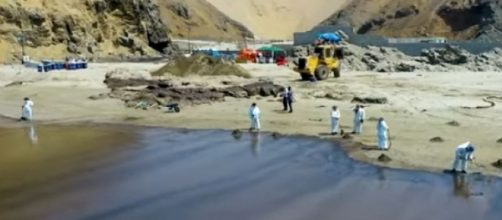The undersea volcano in Tonga has led to an ecological disaster in Peru, located 6,200 miles away. The volcano's eruption gave rise to a series of strong waves that traveled to the Pacific coast of Peru. It is strange to see the waves travel long distances and disturb people's lives. Loading of oil on a boat was in progress when the waves struck. The result was the spillage of thousands of barrels of oil into the Peruvian waters. The incident happened at La Pampilla, the main oil refinery in the country. It was a major ecological disaster.
The Spanish company Repsol manages it, and it can process hundreds of thousands of barrels daily.
The spillage led to protests by the local fishermen. The sequence of events indicates that an Italian-flagged ship was loading the oil into the refinery. At that time, the strong waves came into the picture. They destabilized the boat causing the oil to spill into the ocean. Repsol attributed it to "the violence of the waves."
Waves from the volcano eruption contaminated the waters in Peru
Ruben Ramirez is the environment minister of Peru. He described the extent of contamination of the waters due to the oil spillage. It seems there were an estimated 6,000 barrels of oil involved in the spill, and the area is rich in marine biodiversity. On the northwest of the facility, the shiny black liquid was visible on the sands apart from dead marine creatures.
It was an ecological disaster and a freak of nature that saw waves from the eruption of a volcano travel more than 6000 miles to topple the barrels of oil. Repsol deputed its workers to remove the oil-stained sand and the spilled oils. It was an effort to restore the environment.
The volcano of Tonga destroyed marine species in far-off Peru
Sky News quotes a leader of the local fishermen saying: "That is preying, killing, all the eggs, all the marine species." Those engaged in the oil spill cleanup were collecting the oil that had reached the sand but did not bother about the oil in the seawater. He lamented that the sea provides food.
In the absence of a contingency plan, it destroys a biodiversity base. The oil spills affected seabirds and dolphins. Moreover, the catastrophe led to restricted access to traditional fishing areas. That has financial implications.
Oil spill at a refinery in Peru due to waves of a volcano in Tonga
The Peruvian government says the oil spill at a refinery in Peru during high waves from the explosion of a volcano in Tonga is an "ecological disaster." The authorities confirm damages to animal and plant life in protected zones. The spill is spread over an area of nearly 6,950 square miles around islands and fishing regions.
The spillage endangers not only the environment on land but also the waters. There is a risk to the lives of birds, marine animals, and fish. These have a direct bearing on the lives of the local people. They lose their source of income till such time normalcy returns.


